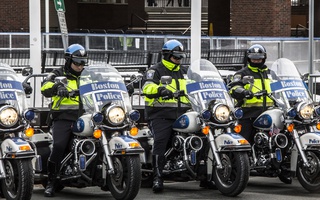While growing up in Long Island City, Walter Hanchuk was constantly reminded of his Ukrainian heritage. His parents often spoke the language; his grandparents reminisced about the homeland.
But despite this indoctrination and years of Ukrainian Saturday school, including language and cultural classes, the 18-year-old student found himself drifting away from his roots.
To remedy that, Hanchuk is completely engrossing himself in Ukrainian culture this summer through the Harvard Ukrainian Research Institute's (HURI) eight-week summer program.
Hanchuk and 51 other students from the United States, Canada and Italy are rediscovering their heritage through the Institute's intensive academic and residential program.
"This is a way to return to something that your relatives have taught you about, but somehow you drifted away from," Hanchuk, a Cooper Union sophomore, said.
The Institute offers courses in Ukrainian literature, language and history, in addition to guest lectures, films and a unique residential plan, which houses nearly all the HURI students together on the third floor of Mather House.
The program is sponsored entirely by the Research Institute and receives no financial backing from Harvard University. Since its fundraising efforts began in the late 60s, the Research Institute has received tremendous widespread support from Ukrainian Americans, according to Director Don Ostrowski.
In contrast to most money drives which rely on large donations, the HURI has raised funds from a large pool of Ukrainians on a nickel-and-dime basis. Several years ago, more than 15,000 members of the Ukrainian community raised $1.8 million to endow three University chairs for Ukrainian language, literature and history.
The program is a profound cultural awakening for Ukrainian Americans, who account for 70 percent of the summer program's enrollment, say faculty and students.
"This program is the beginning of a life-long exploration of one's Ukrainian background," says Olga Andriewsky, administrator of the program. "It's the time when they become very interested in their family history.
Michael Lechman of Purdue University echoes similar sentiments. "Being in this atmosphere, I'm beginning to feel a lot more Ukrainian and realizing I should be very proud of my heritage."
As a result of the program's impact, parents from the Ukrainian community in the United States and Canada, which numbers about 1 million in both nations, have sent many of their children to the Institute to become culturally educated. Hanchuk and Lechman are the third members in their family to attend.
Support among the Ukrainian community is so passionate, Institute officials say, that one man sold his house to give the program the proceeds. "Much of the community feels so strongly about the work at the Institute that they are greatly committed to it," says Marta Baziuk, a Ukrainian American and former student in the program.
Institute officials say that they expect an increase in larger personal donations as the generation of post World War II Ukrainian immigrants dies out. HURI recently received a bequest of about $1.5 million, bringing its endowment above $3 million.
Members of the Ukrainian community say the existence of the Ukrainian Institute at Harvard--which is the only one of its kind in the United States--boosts the morale of the entire community.
Read more in News
Carter Lord, Harvard's Star End, Will Sign With Cowboys of NFLRecommended Articles
-
UkraineMuch of the world's attention was focused on Ukraine in late April and early May, following the meltdown at the
-
Ukraine Maps Arrive at HarvardThe family of a prominent Ukrainian icon has donated to Harvard a collection of almost 900 maps thought to be
-
Prof Looks Beyond Traditional HistoryAfter penning a biography on the greatest Ukrainian historian of the 20th century, Serhii Plokhii is now prepared to take
-
Not Just a Crimean CrisisIn Crimea, more than Ukraine is at stake.
-
 Demonstrators Flood Square for Obama’s Visit
Demonstrators Flood Square for Obama’s Visit -
The White CrossAnd yet, America was all they were to know until they died.













